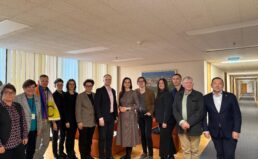The international LGBTI rights association ILGA-Europe has published a review of 2021, which reveals the situation of LGBTI rights in Europe and Central Asia. The publication reviews legal, political and social developments in 54 countries and 4 European institutions, revealing key trends in LGBTI human rights.
On the one hand, the year 2021 was marked by growing rhetoric of politicians and other leaders against LGBTI people, which fuelled a wave of violence – hate crimes against LGBTI people were reported in all European countries this year. On the other hand, LGBTI people and their supporters have shown resilience and actively opposed hatred and exclusion of LGBTI people.
The hostility was undoubtedly affected by the year-long struggle due to the COVID-19 pandemic. Some politicians have taken advantage of the pandemic and the accompanying restrictions to incite hatred, and vulnerable groups in society, including the LGBTI community, have become even more vulnerable. Many European countries failed to meet the needs of the LGBTI community during the pandemic. Civil society organizations have taken on this task, providing a full range of assistance and emotional support services. LGBTI rights activists have faced burnout to secure funding for their activities.
The report also highlights the effects of democratic erosion and political instability. In Belarus, the brutal crackdown on civil society that began during the mass protests in 2021 affected LGBTI organizations, publications and human rights defenders. Declared “against the state” by the authorities, the individuals were filmed and forced to “acknowledge” homosexuality. Activists from Albania, Hungary and Poland are also leaving their country due to the difficult situation.
It is also noted that in 2021, the rainbow flag is increasingly being used as a symbol of fragmentation rather than unity. Created more than 40 years ago by a member of the LGBTI community, the rainbow flag symbolized dignity, diversity, and harmony, and last year the rainbow flag was used by both LGBTI supporters and despisers. The situation was exacerbated in June when UEFA refused to allow the Munich football stadium to be lit in rainbow in support of LGBTI people in Hungary citing political reasons during the European Football Championship. Reports of rainbow flags burned, teared, and desecrated in public spaces soon became more frequent. The wars of rainbow flags also began in Lithuania. In March, a rainbow graffiti at the Vilnius underground passage was repainted in the colours of the national flag. A rainbow crossing was destroyed in May.
2021 in Lithuania: Hate caused by quarantine fatigue, hopes for the Law on Partnership and the challenge posed by migrant crisis
In 2021, the LGBTI community in Lithuania not only experienced a number of challenges, but also showed resilience and actively pursued a breakthrough in the field of LGBTI human rights. Today we converse about the events of the past year with Vladimir Simonko, the Executive Director of the National LGBT Rights Organization LGL, and Monika Antanaitytė, LGL Project Manager who has contributed to the “ILGA-Europe” review chapter on Lithuania at the expert level.
What do the “Rainbow Wars” during the lockdown say about 2021?
Vladimir: The restrictions on COVID-19 appear to have had a negative impact on certain groups in our society. Part of the public has found a “scapegoat” and poured out their anger on the LGBTI community. Hate arrows have been directed at the LGBTI community. They tried to show that the LGBTI community has no place in our society, which has been symbolized by the destruction of LGBTI community symbols.
What are the main challenges you faced last year? What lessons have we learned?
Vladimir: We entered last year with high expectations, as political forces came to the Parliament supporting LGBTI rights with sufficient clarity. The declared priorities of these parties have given our community hope. However, 2021 showed us that human rights issues have been side-lined in one way or another. We observed the Seimas’ hesitations regarding the Law on Partnership and other issues important for LGBTI rights and its removal from the political agenda. As a result, our community has been disappointed.
We also noticed the need for new leadership, which was answered by Rasa Račienė and the organization “Mothers for LGBTQ + children”. Kaunas Pride should also be borne in mind, which has shown that not all cities accept the LGBTI community in the same way as Vilnius.
Monika: I am glad that there were hints last year about improving the legal situation of LGBTI people. However, there has been no fundamental change: we do not have an administrative procedure for legalizing the recognition of gender identity, same-sex relationships are not recognized and a discriminatory provision in the Law on the Protection of Minors still applies. It is to be hoped that 2022 will bring the much-needed change.
The section on Lithuania in the ILGA-Europe report focuses on the migrant crisis. How do you assess the actions of the Lithuanian authorities in the context of this crisis?
Monika: Lithuanian institutions are struggling to manage irregular migration processes in line with international standards. We have received a number of reports from asylum seekers complaining about both reception conditions and procedural irregularities. We initially received reports that asylum seekers had been asked a number of highly personal, redundant questions. From the totality of the information available to LGL, it can be concluded that the survey model of asylum seekers was not applied properly.
Subsequently, the situation at least partially stabilized, and LGL approached the relevant institutions, including the Office of the Seimas Ombudsperson, to ensure that persons with special needs and protected characteristics should be separated from other migrants and their safety ensured.
We are currently receiving information that people with certain specific medical needs do not always receive help that meets their condition and needs. The state has extended the terms of temporary accommodation for migrants without the right to move outside the territory of the Refugees Reception Center, so it can be said that migrants are de facto detained. Asylum seekers who use state-guaranteed legal aid also complain that it is quite difficult to obtain information about the progress of their asylum process. The current situation of irregular migration has highlighted ongoing problems in this area, which need to be addressed immediately.
The report notes that the number of hate speech cases has risen sharply over the past year. Lithuanian politicians do not shy away from inciting hatred either. How to curb hate speech against the LGBTI community?
Monika: Statements of hatred among politicians are still not uncommon. The hatred spread by politicians is much more dangerous as it reaches a wider range of individuals. This creates a dangerous political environment, especially when insufficient action is taken to curb such statements.
Vladimir: The background of hatred has been, is and will continue to be. What matters is how law enforcement and society are prepared to respond to this phenomenon. It must be acknowledged that the community proactively raises this issue and does not allow hatred spreaders in the public sphere to relax. However, our law enforcement is lagging behind in this regard. Their position on hate speech should be publicly clarified.
How could we define the Family March which took place in Vilnius last year, taking to account the context of incitement to hatred and ongoing war in Ukraine?
Vladimir: The Family March is a kind of litmus test showing the mood in society. It has never been a secret to me that part of our society is hostile to human rights. We have seen some consolidation of the opposition to human rights during this march last year. I hope that human rights opponents will not be able to join forces during the municipal or parliamentary elections, as the emergence of such a political force in government will not do the LGBTI community any good. Therefore, in addition to the consolidation of the opposition, a unification of human rights defenders must take place. I hope that during the Baltic Pride in Vilnius we will be able to mobilize people who are not indifferent to human rights.
What has been achieved in the field of transgender rights over the past year?
Monika: Although the much-needed decision-making at the legislative level has not been achieved, changes have taken place at the non-legislative level in the light of emerging case law. A new basis for changing the name has been introduced, which can help people seeking gender recognition. However, this addresses only a very small number of situations and does not have a significant impact on the current regulatory gap. One of the shortcomings is that the Law on Equal Opportunities does not explicitly prohibit discrimination on the grounds of gender identity.
You mentioned an aroused hope for the law of partnership. The law did not receive support in the Parliament.
Monika: The fact that the law on partnership in general has already appeared on the political agenda is an important and welcome change. However, when it comes to partnership law, it is not just the willingness to pass a law that matters, but also the quality of the law: the level of legal protection it will provide for same-sex families. It is unfortunate that even in the initial stage, the Parliament did not have the political will to approve the extremely compromise draft law.
How do you assess the prospects for the Partnership Law?
Vladimir: I would not want to deprive our community of hope. However, it will be difficult to pass a law on partnership in the current Parliament. Not because some politicians don’t want that. Apparently, there is a tendency as to how change must take place. Sudden change cannot take place without greater public support. This means that if we do not work together strategically (community, municipalities, government, parliament), we will certainly not be able to achieve tangible results in the near future. It must be made clear that the submission of a draft law alone will not solve the problem, as this law has yet to be adopted and implemented. Therefore, it will be necessary to work longer and more consistently. I wish our parliamentarians success in raising this issue, because the more we talk about it, the more opportunities we have to influence the part of society that is undecided on the issue of same-sex partnerships.
I would like to recall the example of Ireland, where the public expressed their support for marriage equality in a referendum. However, the local LGBTI community has had to work very hard to gain such support in society. I do not think that Lithuania will have its own way in this regard. I believe that more work will be needed and that there will need to be far more initiatives in this area than there were last year. If we do not unite and work together, we will have to wait longer for the desired result. I hope that the Baltic Pride in Vilnius this summer will show that we can unite and send an important message that we need this law.
Some MPs came up with initiatives to remove the consideration of the Law on Partnership from the political agenda of the Parliament. How do you assess such efforts in the context of the ongoing war in Ukraine?
Vladimir: I hope that these politicians will curb their populist needs and stop using the war in Ukraine as a pretext to resist the changes that our community has been waiting for since the restoration of independence. It is time to repay the debt to our community, which contributes to the well-being of our state and to remain united in the face of our enemy. We will all feel much safer then.
The article was prepared under the framework of the project Baltic Pride 2022 Communication Campaign, funded by the Government of the Federal Republic of Germany.








